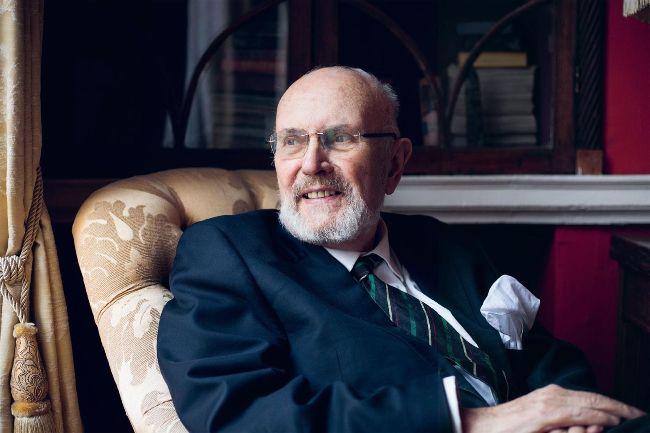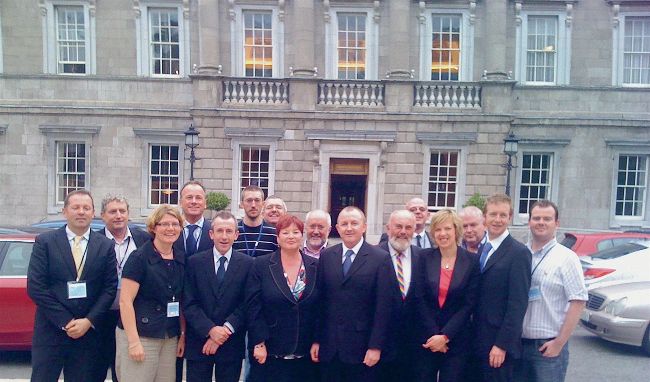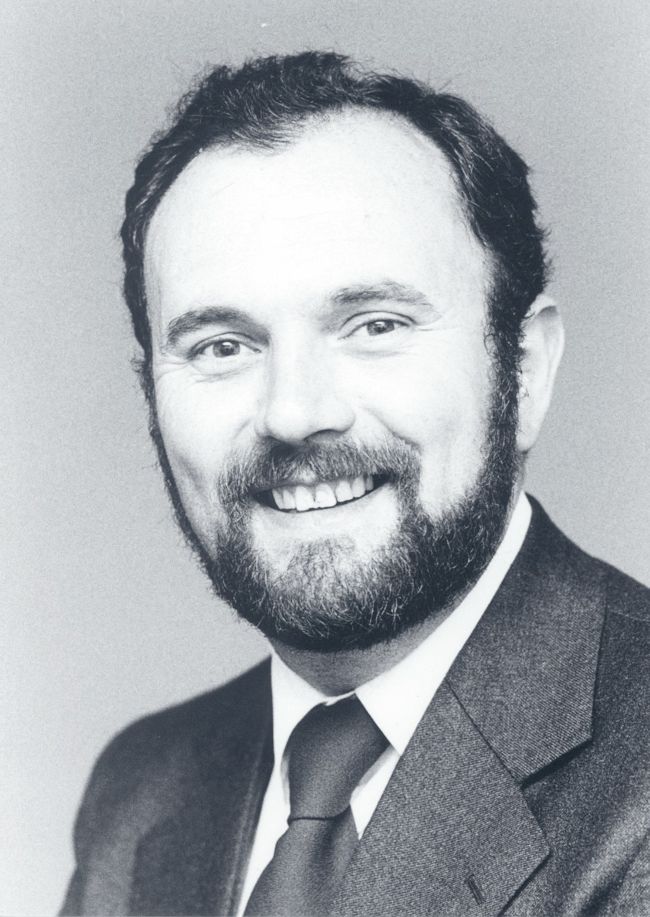Politician - Activist - Changemaker
The Glant
On November 14, 2023, Ireland’s longest-serving senator, David Norris, announced his retirement after 36 years of outstanding service. Known affectionately as the ‘Father of the Seanad’, the 79 year-old leaves behind a remarkable career, throughout which he broke new ground for the country’s LGBTQ+ community. Alice Linehan captures the journey of a great.

Portraits by Hazel Coonagh.
A former university lecturer, David Norris was at the forefront of the Irish gay rights movement from as early as the 1970’s. Alongside nine others, he was a member of the original Sexual Liberation Movement and took part in the group’s historic 1974 march outside the Department of Justice and British Embassy, calling for the decriminalisation of homosexuality.
The following year, he became the first openly gay person to appear in an Irish television interview. Speaking to Áine O’Connor on RTÉ’s Last House, he used his platform to reinforce the message that “(Homosexuals) are neither sick, ill, pathological, neurotic, or any of these emotive terms that are occasionally used by people who are not well-informed on the subject to conceal their own prejudices and to allege that we are ill.
“I don’t feel ill, I hope I don’t look it. We are of course subject, as ordinary other people are, to head colds, influenza, hangover, to this type of thing, but in the basic sense, we are not sick.”
Norris was a co-founder of the Campaign for Homosexual Law Reform and was also the person who, in 1977, set about achieving decriminalisation in Ireland by challenging the Attorney General in the High Court. Although he lost the initial case and the subsequent appeal in the Supreme Court, he did not give up. Spurred on by the successful 1981 ruling for Northern Irish activist Jeffrey Dudgeon, who had challenged the British government on the same grounds, Norris submitted his case to the European Court of Human Rights in Strasbourg.

Courtesy of Karl Hayden.
"I always, always knew it would happen. I was told it would be a long and hard battle, and it was, but that suited me...
There, he argued that the Offences Against the Person Act 1861, which criminalised “buggery”, and the Criminal Law Amendment Act 1885, which referred to “gross indecency”, were in breach of his right to privacy. He finally won in 1988, resulting in the decriminalisation of homosexuality in Ireland five years later.
“I always, always knew it would happen. I was told it would be a long and hard battle, and it was, but that suited me,” Norris told Trinity News.
Amongst all of this, he opened the Hirschfeld Centre in Dublin in 1979, which served as a vital space for the LGBTQ+ community. Located at Number 10 Fownes Street in Temple Bar, it was the headquarters of the National Gay Federation, now known as the NXF, and housed Tel-A-Friend, the Flikkers disco, a cinema and a café. Norris put his own money into refurbishing the building, knowing that there was a great need for such an establishment.
“It was the first Hirschfeld Centre in the world,” Norris told GCN. “Magnus Hirschfeld was wrongheaded, but he was the first person to really put gay rights on the map, before the First World War even. So he was very significant.
“He was in danger of being forgotten and I thought we should remember him. And I got my great friend, the late Dr Noel Browne, to open it, which he did.”
"I’ve been 36 years in the Senate. I’m the longest-serving Senator ever, so I think it’s time to go.

Courtesy of Irish Queer Archive and National Library of Ireland.
"His campaign slogan: Vote No 1 for Norris for an end to the quiet life in the Senate...
Before abruptly closing in 1987 following a devastating fire, the centre became a hotspot for LGBTQ+ folk in Ireland. Even international icons like Elton John and Freddie Mercury frequented the disco, with Norris recalling those moments with amusement.
“I didn’t know who they were!” he remembered, adding that he asked them both for ID on separate occasions. “You see I’m not that interested in pop music.”
Speaking about Elton, he said, “I knew it was somebody fairly important because he was followed by somebody with freshly squeezed orange juice and a bottle of champagne…The kids were absolutely thrilled! He had to go up to the office to drink his champagne.”
“And Freddie Mercury, I asked for his identity papers as well, I said, ‘Are you a member?’”
Norris began his political career in 1987 when he was elected to Seanad Éireann representing the Dublin University constituency as an Independent candidate. His campaign slogan: “Vote No 1 Norris for an end to the quiet life in the Senate”.
The result made him the first-ever openly gay person to hold public office in Ireland, and since then, he has been re-elected without fail. In January 2024, he will officially leave the post, marking the end of an era.
Speaking about why now is the right time to retire, Norris said, “I’m 80 years old and I’ve been 36 years in the Senate. I’m the longest-serving Senator ever, so I think it’s time to go.”
In a separate interview, he said it is “time to pass on the baton,” and he explained to GCN that he made the announcement early so that “young people have the opportunity to get their campaigns ready for the off.”
36 years is a long time to stay in any position, but David noted the thing that kept him there: passion. “I love the Senate. I absolutely love the Senate,” he stated.
It also allowed him to make a meaningful difference, and he told GCN about one of his highlights.
“One of the things that I am proud of is my aunt went to live in retirement - she was very elderly - in a Church of Ireland home for old ladies. The accountant told them to close it down; they were losing money, and I said, ‘No. Tell them, first of all, you’re not closing down, invite the board members in for lunch with me in this house’.
“And I brought Bob Joyce, who sadly is dead. He was a grandnephew of James Joyce, and he was a financial consultant, and I got Ann Byrne from the Minister’s office, and we had lunch and we put together a rescue plan and rescued it.
“That’s something I’m proud of because those 30 old ladies would have been stuck out on the street.”
Speaking now about how society has changed, particularly for LGBTQ+ people, thanks to his and other’s activism, Norris said, “I think it’s great. A while ago, I was going across O’Connell Bridge and I saw two young men, very handsome, holding hands and I thought, ‘Oh, that’s lovely. That’s what it was all about.’”
He added that while those moments do make him acknowledge and reflect on the work he has done, he doesn’t believe in looking backwards. “Frank O’Connor said that was the most characteristic thing of the Irish people, the backward look, but I think it’s a mistake to be always looking back,” he explained.
In terms of the future and what Norris thinks are the pressing issues for the next generation to tackle, he mentioned monitoring the developments in communication technology, as well as working to improve LGBTQ+ rights in countries with repressive legislation. On a personal note, he has no major plans for his retirement and will stay in his house in Dublin and perhaps visit his property in Cyprus a little more often.
Since announcing that he is leaving the Senate, many of Norris’ colleagues have paid tribute to his fantastic career.
Seanad Cathaoirleach Senator Jerry Buttimer commented, “Thank you David…You have left a huge legacy. My life and that of the LGBTQ community is all the better because of your bravery, courage and determination. Beir bua.”
Sinn Féin Senator Fintan Warfield wrote, “It’s impossible to overstate the bravery and the personal and financial risks and sacrifices that David made, forcing a reluctant administration to repeal discriminatory legislation on consensual sexual intimacy.
“It has certainly been one of the highlights of my political activism to have had the chance to work with David for so long in the Seanad. I hope in retirement that he enjoys a new freedom and a new rhythm and can finish whatever has been left undone.”
Minister Roderic O’Gorman thanked Norris “for his dedication over decades in advocating for the rights of minorities” and said that he “and thousands of others enjoy rights directly as a result of his bravery”.
Labour Party leader Ivana Bacik wished her “dear friend and long-standing colleague…the very best,” adding that everyone in Leinster House will miss him.
GCN would like to join countless others in thanking David Norris for his contribution to Irish society and, in particular, for improving the lives of LGBTQ+ people in this country.
We wish him well in his retirement.